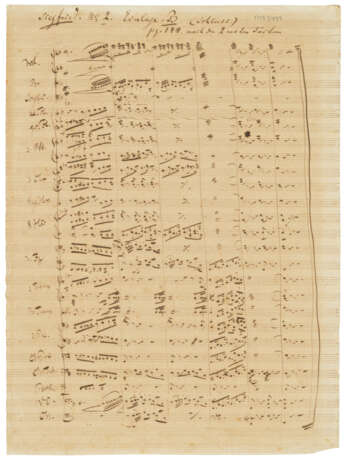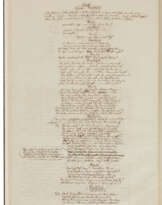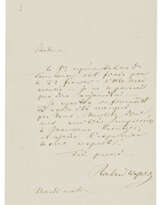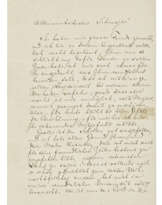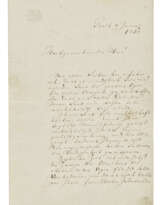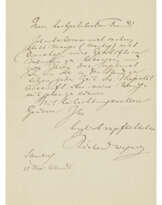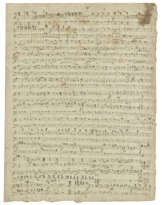ID 1053223
Lot 109 | Richard Wagner (1813-1883)
Estimate value
£ 20 000 – 30 000
Autograph manuscript of the concert ending to Siegfried's 'Sword-Forging Song', near the end of Act One of Siegfried, [1862]
Autograph manuscript for an addition to Siegfried, the third part of the Ring cycle.
Full score, in brown ink on 25 staves, one page, c.334 x 247mm, on 29-stave paper, with full instrumental markings, inscribed by the composer at the head of the page ('Siegfried no.2 Einlage B (Schluss), pg. 144. nach den 2 ersten Tacten'). Blue cloth portfolio.
Provenance:
(1) Sotheby's, 9 June 2010, lot 99.
(2) Schøyen Collection, MS 5449.
The page number '144' in Wagner's annotation relates the first autograph score of Acts 1 and 2 of the work: this was completed in August 1857, after which Wagner set aside Siegfried in order to compose Tristan und Isolde and Die Meistersinger, only resuming the composition of Act 3 in 1869. The first full performance of the music drama was not to take place until the opening of Bayreuth in 1876, but the 'Forging Song' was given a concert performance in Vienna on 1 January 1963, and the present manuscript was probably sent to the conductor Wendelin Weissheimer on that occasion. It is one of the best-known numbers in Der Ring des Nibelungen, the music rising to an almost demonic intensity reflected in such extreme chromaticism as almost to prefigure 20th century atonality.
This manuscript was listed as 'lost' by J. Deathridge, E. Voss & M. Geck in the Wagner-Werk Verzeichnis (1986), p.384 (WWV 86C IX b). The Wagner archives in Bayreuth have an 1894 transcript in a copyist's hand.
| Artist: | Richard Wagner (1813 - 1883) |
|---|---|
| Place of origin: | Germany |
| Auction house category: | Letters, documents and manuscripts |
| Artist: | Richard Wagner (1813 - 1883) |
|---|---|
| Place of origin: | Germany |
| Auction house category: | Letters, documents and manuscripts |
| Address of auction |
CHRISTIE'S 8 King Street, St. James's SW1Y 6QT London United Kingdom | ||||||
|---|---|---|---|---|---|---|---|
| Preview |
| ||||||
| Phone | +44 (0)20 7839 9060 | ||||||
| Buyer Premium | see on Website | ||||||
| Conditions of purchase | Conditions of purchase |
